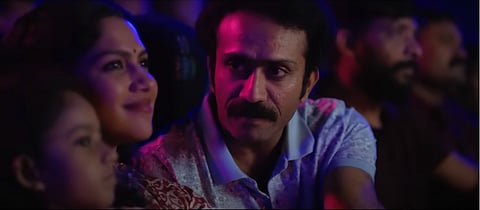Vivekanandan Viralaanu: Kamal-Shine Tom film on women’s bodily rights fails to click
Vivekanandan Viralaanu (Malayalam)(2 / 5)
Beginning a film in the darkness of a room to the sounds of sex, culminating in a scream piercing the walls of an old house, does not seem like a step that Kamal, an oldtimer known for his family dramas and romantic comedies, would take. But Kamal, making films for nearly 40 years, has always tried to stay attuned to the changing tastes of his audience, playing to the younger lot, pushing the budget, and crossing borders to shoot songs. For his newest – Vivekanandan Viralaanu (Vivekanandan is Viral) – a film he is directing after a gap of five years, Kamal seems to have keyed in on trending social media discourses and found a topic of interest – the bodily rights of women. But, for the topic of interest and the casting, the film has little going in its favour.
Shine Tom Chacko, an actor frequently discussed in and outside of film circles – mostly for the wrong reasons – plays the unlikeable Vivekanandan, who, on the surface is a decent family man with an office job, leading a life of discipline. He leaves his house before dawn to reach his work, a district away, after kissing his daughter goodbye and exchanging pleasantries with his wife (Swasika) and mother (Maala Parvathi). He does not drink or smoke or take ‘English medicine’. In the face of adversity, he takes charge. Shine is tailor-made for Vivekanandan. He can tone up or down degrees of irritability at a moment’s notice.
Early posters of the film revealed Shine’s face placed next to a bevy of women, leaving little suspense about the ‘interests’ of his character. Two women play the leads - Swasika and Grace Antony. Mareena Michael Kurisingal plays a third important character. Two younger women are also in the fray. All the women play their parts well, their voices distinguishable as opposed to an earlier generation of female actors who were dubbed for, but they can do little to enhance what seems like a clueless act put together hastily and without direction.
Kamal has either forgotten his earlier methods of letting the script run smoothly through a well-placed plot or let go of them. A constant stream of music makes an already jumpy script even more unappealing. The second half of the film includes a prolonged retaliation by the women, which bears some semblance to a sequence in the Hindi film Darlings, letting it lose its score on originality.
Characters – like the ones by Johny Antony and Maala Parvathi, and a cameo by Manju Pillai – are not wasted. They get their cues and they do it well. The script also tries to sincerely pay heed to the power of social media to make or break a person, with quick nods to victim shaming and online abuse, and the new politically correct sensitivities that even the police are aware of. Unfortunately, little gets conveyed or manages to touch a chord. In attempting a film that deals with the bodily rights and consent of women, the male writer, in his enthusiasm to get it right, inadvertently reduces it to a mockery of feminism.
Disclaimer: This review was not paid for or commissioned by anyone associated with the film. Neither TNM nor any of its reviewers have any sort of business relationship with the producers or any other members of its cast and crew.

